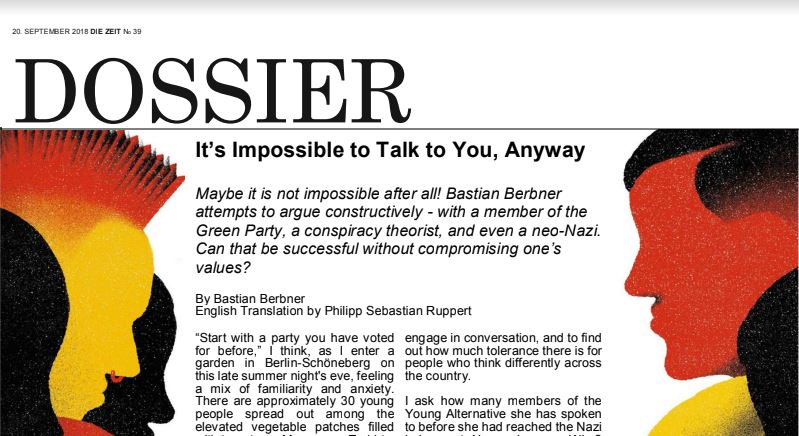It’s Impossible to Talk to You, Anyway
Maybe it is not impossible after all! Bastian Berbner attempts to argue constructively - with a member of the Green Party, a conspiracy theorist, and even a neo-Nazi. Can that be successful without compromising one’s values? By Bastian Berbner English Translation by Philipp Sebastian RuppertBelow is an excerpt from the article:
In a brick building at Columbia University in New York sits a man in a cramped office who can likely answer that question better than anyone. He looks a little like George Clooney, but the sign at his door reads: Peter Coleman. Coleman has in fact been an actor before, but then studied psychology. Today, he leads the Difficult Conversation Lab, a laboratory that is the first of its kind in the world and researches how to disagree constructively.Read the full article here
Ninety-five percent of all conflicts are easy to solve, says Coleman. Who does the dishes? Pasta or pizza? Buy or rent? Sit down, talk about it, that’s it. He is interested in the other 5 percent, those conflicts that are so intractable that they barely appear solvable. Tantalus, the figure from Greek mythology, is a good example.
Because Tantalus dismembered his son and fed him to the gods, they cursed his family. They banished him to the underworld, petrified his daughter, and killed 14 of his grandchildren. Two of the survivors, Atreus and Thyestes, first murdered their half brother, then one seduced the wife of the other and stole his golden fleece. At the make up dinner, Atreus served his brother his own children. Generation for generation it continued; murder, cannibalism, incest, and on the side, the family drama caused the Trojan War. All because one person made a mistake. The conflict almost led itself. Just like some marriage feuds. Just like the conflict in the Middle East.
Imagine if any one of Tantalus descendants had said: Stop! We are going to sit down now and talk about this. The way that can work is what Peter Coleman researches.
Coleman smiles when I tell him that some in Germany say that one shouldn’t talk to politicians and voters of the AfD. “Who else are you going to talk to solve political conflicts? Your friends?” he asks. “And beyond that”, he says, “the oldest rule in the end, whoever knows their opponents, wins. And for that, you have to talk to them.”
Hundreds of times, Coleman has let political opponents argue in his lab—about abortion, about euthanasia, about capital punishment. Many conversations become personal very quickly. Some escalate. But others proceed surprisingly constructively and end in an agreement. Coleman and his team noticed that in the latter conversations, more questions were asked. The subjects were curious, put themselves in the shoes of their opponent. Sometimes they asked: “one moment, just to make sure I got this right, what you are saying is…” then they repeated the opponent’s position, and if they had misunderstood something, refined their understanding until the opponent said: “yes, exactly.”
